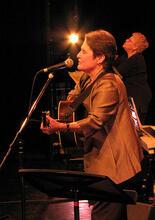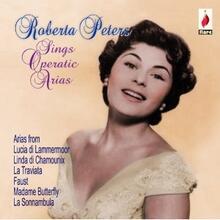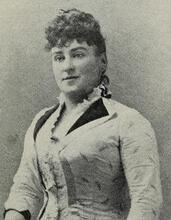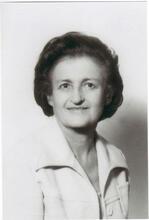Lillian Fuchs
Lillian Fuchs was a gifted teacher and composer, best remembered for her soulful viola performances, which inspired composers to create pieces specifically for her. Fuchs trained as a pianist before studying violin and composition at what would become Juilliard. After graduating, she switched to viola and played with the Perole Quartet until the mid-1940s, when she began touring Europe and the United States. Fuchs composed a variety of pieces for viola, violin, and piano. In the 1950s, she started teaching at summer festivals before accepting teaching positions at the Manhattan School of Music, Juilliard, and Mannes College of Music. Later in life, she returned to her practice of performing with family when she created the Lillian Fuchs Trio with her twin daughters.
Lillian Fuchs is a legend among musicians and chamber music lovers throughout the world. She was a violist, teacher, and composer. Her musicianship and her concept of the viola’s glorious, dark, rich, human sonority continue to enhance and inspire the lives of musicians who studied with her, played her compositions, or had the privilege of hearing her wondrous, soulful playing.
Early Life and Family
Born on November 18, 1902, into a family destined to bear luminaries in the classical music world, Lillian Fuchs began her musical life as a pianist. Her parents, Kate and Phillip Fuchs, loved music. Her father, a self-taught amateur violinist, taught violin to neighborhood children. Her parents’ inspiration led her brother Harry Fuchs, a longtime member of the Cleveland Orchestra, to the cello, and her brother Joseph Fuchs, a well-known concert violinist and teacher, to the violin.
Already an accomplished pianist who used to accompany her brother Joseph, Lillian Fuchs had always wanted to study the violin. She became a violinist, studying with Louis Svecenski and Franz Kneisel at the New York Institute of Musical Art (now the Juilliard School), where she also studied composition with Percy Goetschius, graduating and winning accolades and awards in violin as well as composition.
Performance and Composition Career
Lillian Fuchs made her debut in 1926 as a violinist, but soon after she began playing viola and joined the Parole String Quartet, with which she performed until the mid-1940s. She toured as a solo violist in Europe and the United States and often performed chamber music with her brothers. In the 1940s, Joseph Fuchs co-founded the Musicians Guild in New York City, of which he, Lillian Fuchs, Leo Smit, Leonard Rose, Frank Sheridan, and the Kroll Quartet were members. They performed from an extensive repertoire at New York’s Town Hall and were a great presence in the musical life of New York for many seasons.
In 1953, Lillian Fuchs appeared as soloist at the Casals Festival in Prades, France. Over the decades, she appeared and taught at the summer festivals in Aspen, Colorado, and Kneisel Hall in Blue Hill, Maine. Teaching was always a great love and inspiration for Fuchs. She has helped to shape many of today’s preeminent musicians, passing on her knowledge to violists and chamber musicians at several of the finest conservatories in the country. In 1962, she started teaching at the Manhattan School of Music; in 1971, at the Juilliard School; and in the 1980s, at Mannes College of Music.
Less familiar to the general public are the compositions of Lillian Fuchs. Staples of the technical studies of violists are three sets of works for unaccompanied viola: Fifteen Characteristic Studies (1965), Twelve Caprices (1950), and Sixteen Fantasy Études (1961). In 1956, she composed the Sonata Pastorale for unaccompanied viola. Other published works include Jota and Caprice Fantastique for violin and piano. She also composed unique piano accompaniments to several of the Paganini caprices for violin that she wrote for her brother Joseph.
Lillian Fuchs was the inspiration for some of the greatest composers of the twentieth century. In 1947, Bohuslav Martinu was so inspired by a performance of the Mozart duos by Lillian and Joseph Fuchs that he composed and dedicated to them a set of madrigals for violin and viola, which the brother-and-sister team received several weeks later. For Lillian Fuchs, Martinu also composed Sonata for Viola and Piano in 1955. In 1955, Jacques de Menasce wrote Sonata for Viola and Piano; in 1957, Quincy Porter wrote Duo for Viola and Harp and, in 1962, Duo for Violin and Viola; and in 1973, Vittorio Rieti wrote Triple Concerto for Violin, Viola, Piano, and Orchestra. All of these works were written for Lillian Fuchs.
During her early years of playing the viola, Lillian Fuchs met a young man at one of many musical gatherings at the home of the well-known New York musical patrons, the Leventritts of New York City. Ludwig Stein, a businessman involved in men’s haberdashery and a wonderful amateur violinist, violist, and pianist, was to become her husband for over sixty years, until his death in 1992.
Legacy
The musical tradition has been carried on by the twin daughters of Ludwig Stein and Lillian Fuchs. Barbara Stein Mallow, an accomplished cellist, has an active career, performing solo and chamber music as well as teaching at Kneisel Hall, Queens College, during the summer. Twin sister Carol Stein Amado is the first violinist of the Amado String Quartet in the Philadelphia area and carries on the family traditions of teaching and performing as a soloist. The sisters played with their mother for many years in the Lillian Fuchs Trio.
Lillian Fuchs died on October 5, 1995, at the Actors Fund Nursing Home in Englewood, New Jersey, at age ninety-two.
Grove’s Dictionary of Music; Mallow, Barbara Stein. Interview with author, 1996.
Author’s personal knowledge as a student of Lillian Fuchs, 1964–1973.









![blue.jpg - still image [media] blue.jpg - still image [media]](http://cdn.jwa.org/sites/default/files/styles/medium/public/mediaobjects/blue.jpg?itok=RkdKmpf6)



